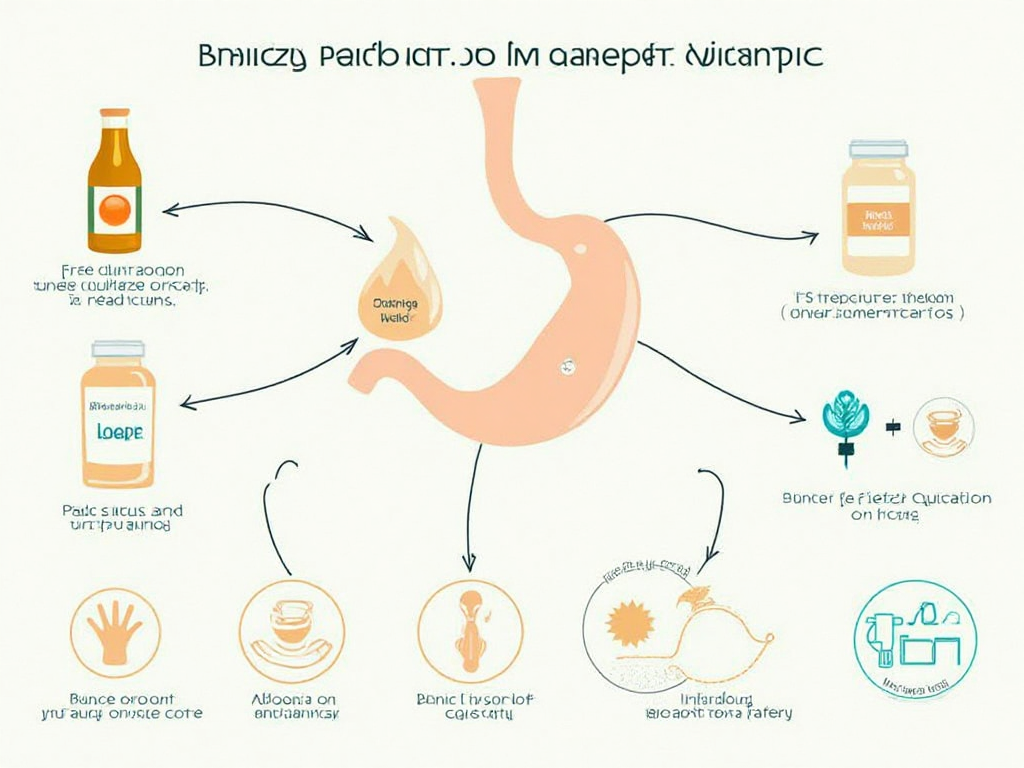STOP Using Apple Cider Vinegar Wrong: Correct Dosage and Contraindications
Improper apple cider vinegar dosage can cause serious health problems that many people are unaware of. Thousands of people consume this natural product daily, but the vast majority don’t know the correct way to use it or its important contraindications.
The growing popularity of apple cider vinegar on social media and television programs has led many people to consume excessive amounts without proper medical guidance. This behavior can result in tooth enamel damage, serious digestive problems, and dangerous drug interactions.
This article will reveal the most common errors in apple cider vinegar consumption and present the correct dosages based on scientific evidence. You’ll also discover when this product can be harmful to your health and how to use it safely and effectively.
Why People Use Apple Cider Vinegar Incorrectly
Misinformation about apple cider vinegar dosage is a real and growing problem. Many people believe that “more is better,” consuming excessive amounts hoping for faster results for weight loss or other promised benefits.
Main Consumption Errors

The first serious error is consuming pure apple cider vinegar without proper dilution. This practice can cause esophageal burns, tooth enamel erosion, and severe gastric mucosa irritation. The product’s high acidity (pH between 2.4 and 3.4) makes dilution essential before consumption.
Another common mistake is consuming high doses thinking it will accelerate results. Many people ingest 3 to 4 tablespoons per day, when the recommended safe dosage is much lower. This practice can lead to hypokalemia (low blood potassium levels) and kidney problems.
Choosing inappropriate timing also represents a frequent error. Consuming apple cider vinegar on an empty stomach can intensify its side effects, especially in people with gastric sensitivity or ulcer history.
Social Media Influence
Social media has significantly contributed to spreading incorrect information about apple cider vinegar dosage. Digital influencers frequently share their personal experiences as if they were universal medical recommendations, without considering individual differences and risks involved.
“Miraculous” recipes circulate widely, promising rapid weight loss with excessive doses of apple cider vinegar. This information rarely mentions potential side effects or the need for medical supervision, especially for people with preexisting health conditions.
Correct Apple Cider Vinegar Dosage for Different Objectives
The correct apple cider vinegar dosage varies according to the desired objective and individual characteristics of each person. Establishing the appropriate amount is fundamental to obtain benefits without compromising health.
Dosage for Weight Loss
For weight loss objectives, the recommended dosage is 1 to 2 teaspoons (5-10ml) diluted in at least 200ml of water, consumed 15-30 minutes before main meals. This amount should be divided throughout the day, never exceeding 2 tablespoons (30ml) in 24 hours.
Scientific studies demonstrated that dosages exceeding 30ml daily don’t provide additional weight loss benefits but significantly increase the risk of side effects. Consistency in use is more important than the amount consumed.
It’s crucial to start with smaller doses (1 teaspoon per day) and increase gradually, allowing the body to adapt to the product’s acidity. This progressive approach reduces the risk of digestive discomfort and other adverse effects.
Dosage for Glycemic Control
For people seeking better blood sugar level control, the appropriate apple cider vinegar dosage is 1 tablespoon (15ml) diluted in 250ml of water, consumed immediately before carbohydrate-rich meals.
This dosage proved effective in clinical studies for reducing postprandial glycemic peaks in people with type 2 diabetes and prediabetes. However, it’s essential that diabetic people consult their doctors before including apple cider vinegar in their routine, as it may potentiate hypoglycemic medication effects.
Dosage for Improved Digestion
When the objective is improving digestion and reducing symptoms like occasional heartburn and heaviness after meals, the recommended dosage is 1 teaspoon (5ml) in 150ml of warm water, consumed 10-15 minutes before main meals.
This amount is sufficient to stimulate digestive enzyme production without causing excessive digestive tract irritation. People with gastric sensitivity should start with even smaller doses and evaluate individual tolerance.
Main Contraindications and Side Effects
Knowing apple cider vinegar contraindications is as important as knowing the correct dosage. Certain health conditions and medications can make its use inappropriate or dangerous.
Medical Conditions that Contraindicate Use
People with erosive gastropathy, active peptic ulcer, or history of digestive bleeding should not consume apple cider vinegar. High acidity can aggravate existing lesions and delay gastric mucosa healing processes.
Patients with gastroesophageal reflux disease (GERD) should also avoid consumption, as vinegar can intensify heartburn and acid regurgitation symptoms. The valve between esophagus and stomach can be further compromised by additional acidity.
Individuals with osteoporosis or low bone mineral density should use apple cider vinegar with extreme caution. Regular consumption may interfere with calcium absorption and other minerals essential for bone health.
Dangerous Drug Interactions
The interaction between apple cider vinegar and diabetes medications represents a significant risk. The product can potentiate insulin effects and other hypoglycemic agents, leading to severe hypoglycemia episodes.
Diuretic medications, especially thiazides and loop diuretics, may have their effects intensified by apple cider vinegar. This combination can result in excessive potassium and other electrolyte depletion, causing potentially fatal cardiac arrhythmias.
Anticoagulants like warfarin may have their efficacy altered by regular apple cider vinegar consumption. Gastric pH alteration can affect these medication absorption, compromising blood coagulation control.
Common Side Effects
The most frequent side effects include tooth enamel erosion, especially when consumed without adequate dilution. This damage is irreversible and can lead to permanent dental sensitivity and greater susceptibility to cavities.
Digestive disturbances like nausea, vomiting, and diarrhea are frequently reported, particularly in people who consume excessive doses or have preexisting gastric sensitivity. These symptoms generally resolve with dosage reduction or use suspension.
Hypokalemia (low potassium levels) can occur with prolonged use of high doses. This electrolyte imbalance can cause muscle weakness, cramps, heart rhythm alterations, and in extreme cases, temporary paralysis.
How to Consume Apple Cider Vinegar Safely

Establishing a safe consumption routine is fundamental to harness potential apple cider vinegar benefits without compromising health. Proper preparation and correct timing make all the difference in obtained results.
Correct Dilution Forms
Adequate dilution is the first step for safe consumption. The minimum recommended proportion is 1 part vinegar to 8-10 parts water. For 1 teaspoon of vinegar, use at least 150-200ml of filtered water.
Never consume pure apple cider vinegar or in highly concentrated preparations. High acidity can cause chemical burns in the esophagus and stomach, besides irreversible tooth enamel damage. Even diluted, using a straw is recommended to minimize teeth contact.
Adding a pinch of baking soda to the mixture can help partially neutralize acidity, reducing irritation potential. This strategy is especially useful for people with gastric sensitivity or digestive problem history.
Best Time for Consumption
Consumption timing directly influences both apple cider vinegar efficacy and side effects. For objectives related to glycemic control and weight loss, consume 15-30 minutes before main meals.
Avoid consumption on a completely empty stomach, especially in the morning. This practice can intensify gastric irritation and increase nausea and abdominal discomfort risk. Prefer consuming after a light snack.
Never consume apple cider vinegar immediately before bedtime. Horizontal position can facilitate acid reflux, causing esophageal irritation and interfering with sleep quality.
Care During Consumption
After consuming apple cider vinegar, wait at least 30 minutes before brushing teeth. Acidity temporarily softens tooth enamel, and immediate brushing can cause irreversible damage. Rinse mouth with water after consumption.
Monitor your individual response to the product. Symptoms like persistent heartburn, nausea, appetite changes, or abdominal discomfort may indicate inappropriate dosage or product intolerance.
Keep a consumption diary recording dosage, times, and observed effects. This practice helps identify patterns and optimize individual use, besides providing valuable information for discussion with healthcare professionals.
Myths and Truths about Apple Cider Vinegar
Apple cider vinegar popularization generated a series of conflicting information and myths that need clarification. Separating facts from fiction is essential for conscious and safe use.
Common Myths Debunked
Myth: “Apple cider vinegar burns fat directly” Truth: The product can aid weight loss through increased satiety and slight metabolism improvement, but doesn’t “burn” fat directly. Weight loss requires consistent caloric deficit through diet and exercise.
Myth: “Higher doses provide faster results” Truth: Studies demonstrate that doses exceeding recommendations don’t offer additional benefits, only significantly increasing serious side effect risk.
Myth: “Apple cider vinegar cures diabetes” Truth: While it may aid glycemic control, the product doesn’t replace conventional medical treatments. Diabetic people should always consult their doctors before including apple cider vinegar in their routine.
Scientifically Proven Benefits
Scientific research confirmed that apple cider vinegar, when used properly, can offer some real health benefits. Acetic acid, the main component, demonstrated positive effects in controlled studies.
Insulin sensitivity improvement is one of the most studied benefits. Clinical trials showed that vinegar consumption before carbohydrate-rich meals can reduce postprandial glycemic peak by up to 20%.
The satiety effect also has scientific basis. Studies indicate that apple cider vinegar can increase satiety sensation for up to 2 hours after consumption, potentially reducing total caloric intake.
Limitations and Realistic Expectations
It’s important to establish realistic expectations about apple cider vinegar effects. Benefits are modest and work better as adjuvant to a healthy lifestyle, not as single solution for health problems.
Weight loss associated with apple cider vinegar use is gradual and limited. Long-term studies show average reductions of 1-2 kg in 12-week periods, always associated with dietary changes and increased physical activity.
Individual effects vary considerably. Factors like genetics, intestinal microbiota, medications in use, and preexisting health conditions significantly influence product response.
When to Consult a Healthcare Professional
Recognizing when to seek medical guidance is crucial for safe apple cider vinegar use. Certain situations require professional evaluation before starting or maintaining consumption.
Situations Requiring Medical Supervision
People with type 1 or 2 diabetes should always consult their endocrinologists before including apple cider vinegar in their routine. Interaction with hypoglycemic medications can be dangerous and requires professional monitoring.
Patients using heart disease medications, especially diuretics and anticoagulants, need medical evaluation. The combination can significantly alter these medication effects, compromising treatment.
Individuals with eating disorder history should discuss use with specialized psychiatrists or psychologists. Apple cider vinegar may be incorporated into harmful restrictive behaviors for mental health.
Warning Signs During Use
Persistent abdominal pain, especially in the epigastric region, may indicate severe gastric irritation or ulcer development. These symptoms require immediate medical evaluation and use suspension.
Significant blood sugar level alterations, manifested by frequent dizziness, excessive sweating, or hypoglycemia episodes, should be reported to the attending physician.
Electrolyte imbalance symptoms like extreme muscle weakness, frequent cramps, or heart palpitations may indicate hypokalemia and need urgent medical investigation.
Recommended Monitoring
For regular apple cider vinegar users, especially those with preexisting health conditions, periodic laboratory exams are recommended. Complete blood count, electrolytes, and kidney function should be monitored.
Regular dental evaluations are important to detect early signs of dental erosion. Dentists can provide specific guidance for enamel protection in apple cider vinegar users.
Nutritional monitoring can optimize benefits and minimize risks. Specialized nutritionists can personalize recommendations according to individual objectives and general health status.
Related Internal Links:
If you’re concerned about muscle health after 60, discover which supplements might be harming your mobility at Vitamins That Weaken Your Legs After 60: What to Avoid and Why, where you’ll find essential information about preserving leg strength in your golden years.
To complement your knowledge about safe and effective natural remedies, check out our guide on Ginger Tea for Throat Mucus: Eliminate Discomfort Naturally, which presents another natural alternative with proper dosage and scientifically proven benefits.
Reliable External Link:
For additional medical information about apple cider vinegar and its drug interactions, consult the National Institutes of Health (NIH) drug database, which offers updated information about natural product safety and efficacy.


One response
canadian drugs pharmacy https://muscpharm.xyz/# MuscPharm